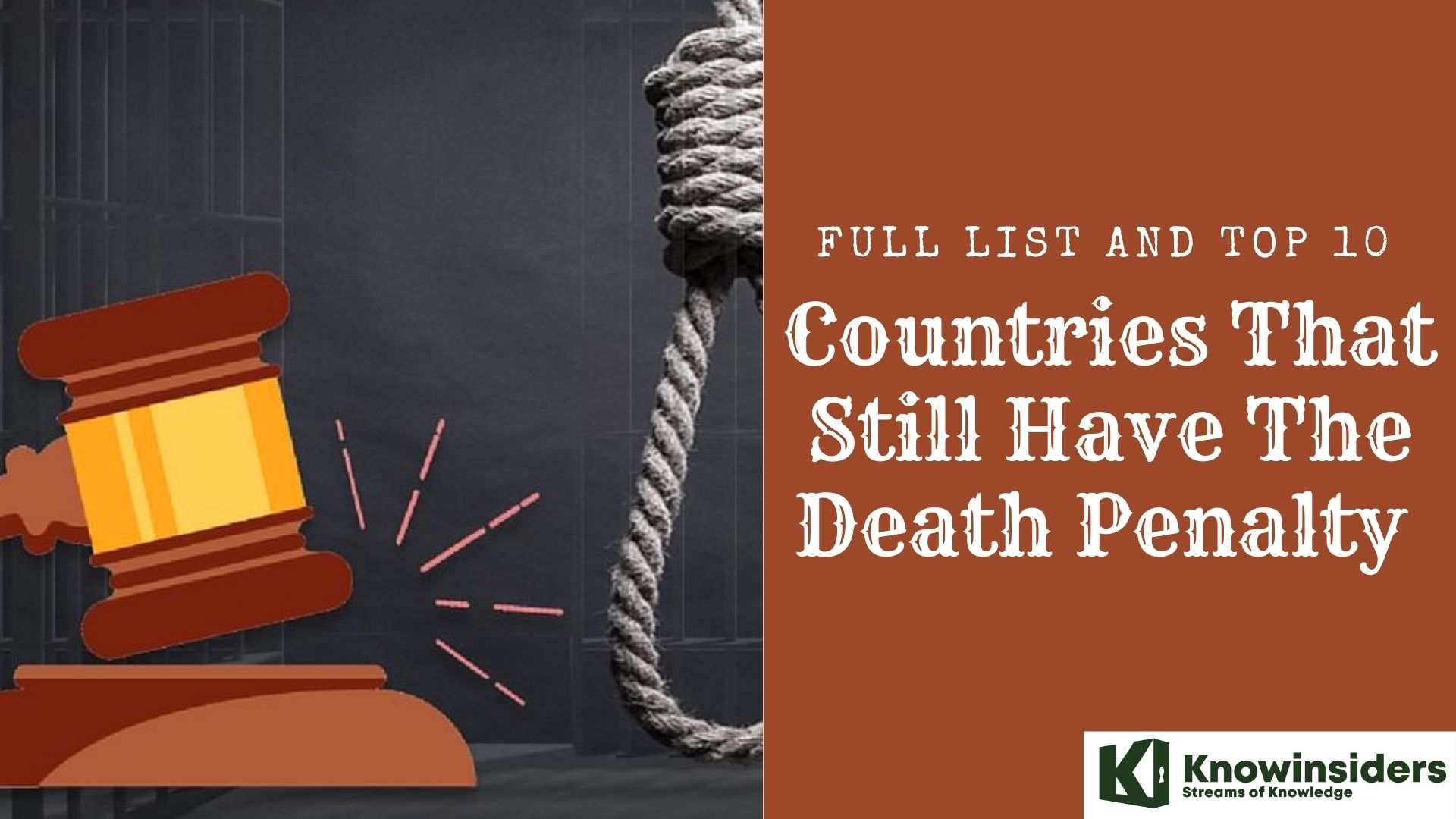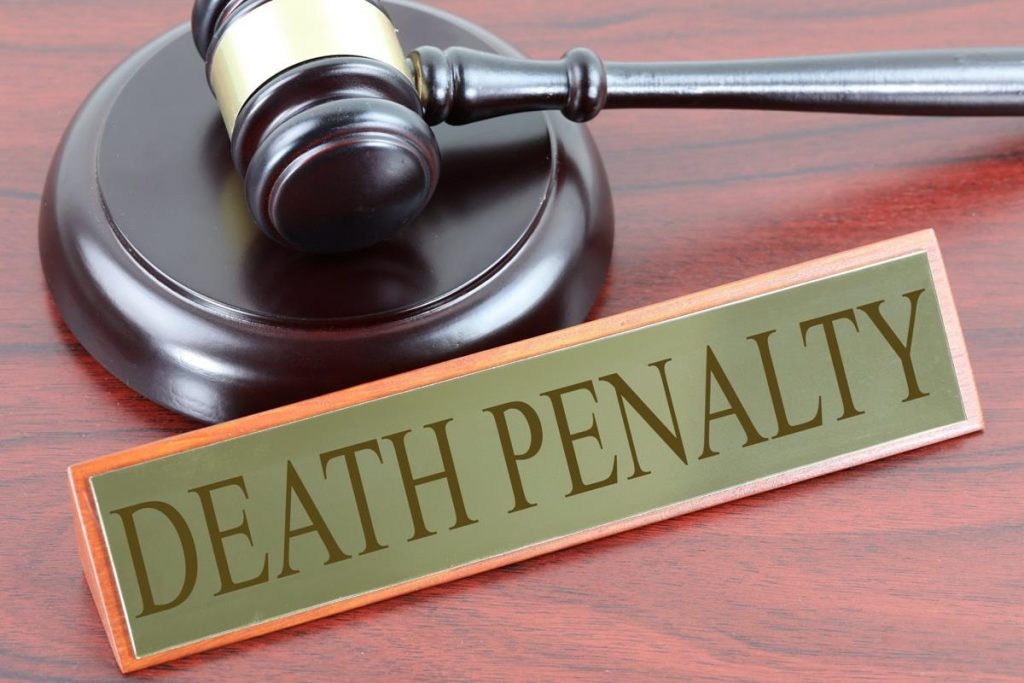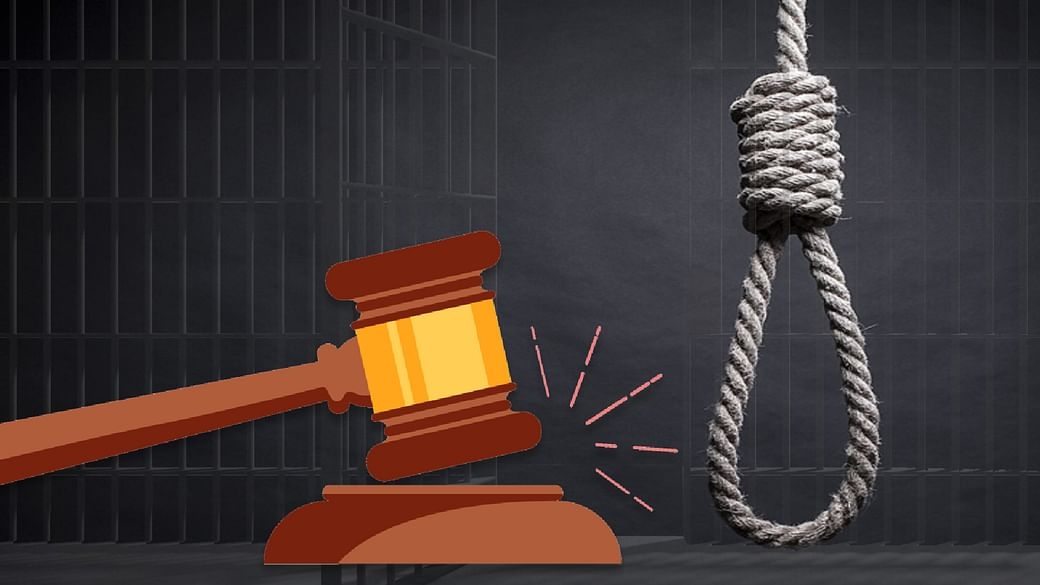Top 10 Countries That Still Have The Death Penalty In The World - Full List
 |
| Full List And Top 10 Countries That Still Have The Death Penalty |
| Table Content |
According to the Death Penalty Information Center, more than 70% of the world's countries have abolished capital punishment in law or practice, the most recent of these being Chad in 2020. The next may be Malawi, whose Supreme Court of Appeal ruled the death penalty unconstitutional in April 2021, or Sierra Leone, whose voted to abolish capital punishment in July 2021. Similar data from Amnesty International states that at the end of 2020, 108 countries had abolished the death penalty in law for all crimes, 144 countries had abolished the death penalty in law or practice, 28 countries had effectively abolished the death penalty by not executing anyone in the past 10 years, and 55 countries still retained the death penalty for ordinary crimes.
Here are the full list and top 10 countries that still keep the death penalty.
What is Death penalty?
 |
| Photo: Daily Montanan |
Capital punishment, also called death penalty, execution of an offender sentenced to death after conviction by a court of law of a criminal offense. Capital punishment should be distinguished from extrajudicial executions carried out without due process of law. The term death penalty is sometimes used interchangeably with capital punishment, though imposition of the penalty is not always followed by execution (even when it is upheld on appeal), because of the possibility of commutation to life imprisonment.
Early Death Penalty Laws
The first established death penalty laws date as far back as the Eighteenth Century B.C. in the Code of King Hammurabi of Babylon, which codified the death penalty for 25 different crimes. The death penalty was also part of the Fourteenth Century B.C.’s Hittite Code; in the Seventh Century B.C.’s Draconian Code of Athens, which made death the only punishment for all crimes; and in the Fifth Century B.C.’s Roman Law of the Twelve Tablets. Death sentences were carried out by such means as crucifixion, drowning, beating to death, burning alive, and impalement.
In the Tenth Century A.D., hanging became the usual method of execution in Britain. In the following century, William the Conqueror would not allow persons to be hanged or otherwise executed for any crime, except in times of war. This trend would not last, for in the Sixteenth Century, under the reign of Henry VIII, as many as 72,000 people are estimated to have been executed. Some common methods of execution at that time were boiling, burning at the stake, hanging, beheading, and drawing and quartering. Executions were carried out for such capital offenses as marrying a Jew, not confessing to a crime, and treason.
The number of capital crimes in Britain continued to rise throughout the next two centuries. By the 1700s, 222 crimes were punishable by death in Britain, including stealing, cutting down a tree, and robbing a rabbit warren. Because of the severity of the death penalty, many juries would not convict defendants if the offense was not serious. This lead to reforms of Britain’s death penalty. From 1823 to 1837, the death penalty was eliminated for over 100 of the 222 crimes punishable by death. (Randa, 1997)
Why Did Countries Abolish Death Penalty?
 |
| Photo: Sabrang India |
The risk of executing innocent people exists in any justice system
There have been and always will be cases of executions of innocent people. No matter how developed a justice system is, it will always remain susceptible to human failure. Unlike prison sentences, the death penalty is irreversible and irreparable.
The arbitrary application of the death penalty can never be ruled out
The death penalty is often used in a disproportional manner against the poor, minorities and members of racial, ethnic, political and religious groups.
The death penalty is incompatible with human rights and human dignity
The death penalty violates the right to life which happens to be the most basic of all human rights. It also violates the right not to be subjected to torture and other cruel, inhumane or degrading treatment or punishment. Furthermore, the death penalty undermines human dignity which is inherent to every human being.
The death penalty does not deter crime effectively
The death penalty lacks the deterrent effect which is commonly referred to by its advocates. As recently stated by the General Assembly of the United Nations, “there is no conclusive evidence of the deterrent value of the death penalty” (UNGA Resolution 65/206). It is noteworthy that in many retentionist states, the effectiveness of the death penalty in order to prevent crime is being seriously questioned by a continuously increasing number of law enforcement professionals.
Public opinion is not a major stumbling block for abolition
Public support for the death penalty does not necessarily mean that taking away the life of a human being by the state is right. There are undisputed historical precedences where gross human rights violations had had the support of a majority of the people, but which were condemned vigorously later on. It is the job of leading figures and politicians to underline the incompatibility of capital punishment with human rights and human dignity.
It needs to be pointed out that public support for the death penalty is inextricably linked to the desire of the people to be free from crime. However, there exist more effective ways to prevent crime.
Coutries that Permit the Death Penalty (Amnesty International 2020):
Key:
- Legal — Death penalty is legal and in use.
- Rare — Death penalty is legal, but no executions have taken place in at least 10 years.
- Serious — Death penalty is legal, but only used in extreme cases such as war crimes.
| Country | Type | Country | Type | Country | Type |
| Afghanistan | legal | Guyana | legal | Peru | serious |
| Algeria | rare | India | legal | Puerto Rico | legal |
| Antigua and Barbuda | legal | Indonesia | legal | Qatar | legal |
| Bahamas | legal | Iran | legal | Russia | rare |
| Bahrain | legal | Iraq | legal | Saint Kitts and Nevis | legal |
| Bangladesh | legal | Israel | serious | Saint Lucia | legal |
| Barbados | legal | Jamaica | legal | Saint Vincent & Grenadines | legal |
| Belarus | legal | Japan | legal | Saudi Arabia | legal |
| Belize | legal | Jordan | legal | Sierra Leone | rare |
| Botswana | legal | Kazakhstan | serious | Singapore | legal |
| Brazil | serious | Kenya | rare | Somalia | legal |
| Brunei | rare | Kuwait | legal | South Korea | rare |
| Burkina Faso | serious | Laos | rare | South Sudan | legal |
| Cameroon | rare | Lebanon | legal | Sri Lanka | rare |
| Central African Reublic | rare | Lesotho | legal | Sudan | legal |
| Chile | serious | Liberia | rare | Syria | legal |
| China | legal | Libya | legal | Taiwan | legal |
| Comoros | legal | Malawi | rare | Tajikistan | rare |
| Cuba | legal | Malaysia | legal | Tanzania | rare |
| Dominica | legal | Maldives | rare | Thailand | legal |
| DR Congo | legal | Mali | rare | Tonga | rare |
| Egypt | legal | Mauritania | rare | Trinidad and Tobago | legal |
| El Salvador | serious | Morocco | rare | Tunisia | rare |
| Equatorial Guinea | legal | Myanmar | rare | Uganda | legal |
| Eritrea | rare | Niger | rare | United Arab Emirates | legal |
| Eswatini | rare | Nigeria | legal | United States | legal |
| Ethiopia | legal | North Korea | legal | Vietnam | legal |
| Gambia | legal | Oman | legal | Western Sahara | rare |
| Ghana | rare | Pakistan | legal | Yemen | legal |
| Grenada | rare | Palestine | legal | Zambia | rare |
| Guatemala | serious | Papua New Guinea | rare | Zimbabwe |
What are the 10 countries that still keep the death penalty?
1. China
 |
| Photo: Getty Images |
> Est. executions, 2021: 1,000s
> Method(s): Lethal injection, shooting
Capital punishment in China is a legal penalty. It is commonly applied for murder and drug trafficking, although it is also a legal penalty for various other offenses. Executions are carried out by lethal injection or by shooting. The majority of Chinese people support capital punishment.
The use of capital punishment is active in most East Asian countries and territories, including Japan, North Korea, Malaysia, Thailand, Indonesia, Vietnam, Singapore, and Taiwan. According to Amnesty International, China executes more people than all other countries combined. The exact numbers of executions and death sentences are considered a state secret by China, and are not publicly available. According to the Dui Hua Foundation, a U.S.-based organization, the estimated number of executions has declined steadily in the twenty-first century, from 12,000 each year to 2,400. Although in 2022, World Coalition Against the Death Penalty announced that since 2007, at least 8,000 people were executed in China per year. The Chinese government has taken effective measures in order to limit use of the death penalty, proclaiming that it is doing this with the aim of completely abolishing it.
Capital punishment in China should not be confused with death sentence with reprieve, which is a form of lenient sentencing that is handed down by Chinese courts as frequently as, or more often than, actual death sentences. Death sentence with reprieve is used to emphasize the seriousness of the crime and the mercy of the court, and sometimes inaccurately added to the number of actual death sentences.
2. Iran
> Est. executions, 2021: at least 314
> Method(s): Hanging
Capital punishment is a legal penalty in Iran. Crimes punishable by death include murder; rape; child molestation; homosexuality; pedophilia; drug trafficking; armed robbery; kidnapping; terrorism; burglary; incestuous relationships; fornication; prohibited sexual relations; sodomy; sexual misconduct; prostitution; plotting to overthrow the Islamic regime; political dissidence; sabotage; arson; rebellion; apostasy; adultery; blasphemy; extortion; counterfeiting; smuggling; speculating; disrupting production; recidivist consumption of alcohol; producing or preparing food, drink, cosmetics, or sanitary items that lead to death when consumed or used; producing and publishing pornography; using pornographic materials to solicit sex; recidivist false accusation of capital sexual offenses causing execution of an innocent person; recidivist theft; certain military offenses (e. g., cowardice, assisting the enemy); "waging war against God"; "spreading corruption on Earth"; espionage; and treason. Iran carried out at least 977 executions in 2015, at least 567 executions in 2016, and at least 507 executions in 2017.
Iran is believed to execute the most people per capita. Iran insists that the execution numbers human rights groups allege are "exaggerated," and that executions are only carried out "after a lengthy judicial process." Iranian officials cite that they are "fighting a large-scale drug war along its eastern borders, and the increase of drug lords and dealers causes a rise in executions." According to the BBC, Iran "carries out more executions than any other country, except China".
3. Egypt
 |
| Photo: Getty Images |
> Est. executions, 2021: at least 83
> Method(s): Hanging
Capital punishment is a legal penalty in Egypt. The state carried out at least 44 executions in 2016, at least 35 in 2017, and at least 43 in 2018. On 8 September, 2020 a court in Egypt sentenced 75 people to death and 47 others to life imprisonment. They were charged with murder or membership in a terrorist group. The British newspaper Independent has reported that Najia Bounaim of Amnesty International Middle East and North Africa described the court's sentence to “disgraceful" and "a mockery of justice.". The method of execution is hanging for civilian convictions, and by firing squad for convictions by commissioned military personnel at the time of duty.
The Grand Mufti of Egypt Shawki Ibrahim Abdel-Karim Allam, is responsible under Egyptian law for reviewing all death sentences in Egypt. Legally, his opinion is consultative and non-binding to the presiding court that handed down the death sentence.
Amnesty International accused Egyptian authorities of executing 57 people in October and November alone, nearly double the number recorded in the whole of 2019. Amnesty said the spike in executions followed a botched breakout attempt in September at the Tora Prison in Cairo. Four police officers and four death-row prisoners died in the attempt.
Amnesty International’s annual global review of death penalty ranked Egypt as the world’s third most frequent executioner in 2020. Egypt executed at least 107 people in 2020 following grossly unfair trials and forced confessions as lawyers couldn’t meet their clients or conduct proper investigations due to the COVID-19 pandemic.
4. Saudi Arabia
> Est. executions, 2021: 65
> Method(s): Beheading
Capital punishment is a legal penalty in Saudi Arabia. Death sentences are almost exclusively based on the system of judicial sentencing discretion (tazir), following the classical principle of avoiding Sharia-prescribed (hudud) penalties when possible. In recent decades, the government and the courts have increasingly issued these sentences, reacting to a rise in violent crime during the 1970s. This paralleled similar developments in the U.S. and Mainland China in the late 20th century.
The country executed at least 158 people in 2015, at least 154 in 2016, at least 146 in 2017, 149 in 2018, 184 in 2019, and 27 in 2020. The drastic reduction in 2020 was due to a moratorium on death penalties for drug-related offenses as Saudi Arabia proposed ending the death penalty for these and other nonviolent offences. Additionally, on 26 April 2020, a royal decree ended the execution of people who were juveniles when they committed their crime. (Saudi Arabia had previously executed these people despite having signed the Convention on the Rights of the Child.) Nonetheless, there were 67 executions in 2021, more than doubling the previous year's, according to the European Saudi Organisation for Human Rights. In January 2022, at least 43 detainees, including 12 minors, were threatened with execution. On March 12, 2022, Saudi Arabia executed 81 persons, seven of whom were Yemenis and one of whom was a Syrian, marking the "largest known mass execution" performed in modern history of Saudi Arabia.
5. Syria
> Est. executions, 2021: at least 24
> Method(s): Unknown
Capital punishment is legal in Syria. The Syrian government holds a retentionist view of capital punishment. Current laws allow the death penalty for treason; espionage; murder; arson resulting in death; attempting a death-eligible crime; recidivism for a felony punishable by forced labor for life; political acts and military offences such as bearing arms against Syria in the ranks of the enemy, desertion of the armed forces to the enemy, insubordination, rebellion and acts of incitement under martial law or in wartime; violent robbery; terrorism; subjecting a person to torture or barbaric treatment during the commission of gang-robbery; rape; membership in the Muslim Brotherhood; joining the Islamic State of Iraq and the Levant; drug trafficking; political dissidence and falsification of material evidence resulting in a third party being convicted for a drug offense and sentenced to death.
6. Somalia
> Est. executions, 2021: at least 21
> Method(s): Shooting
Capital punishment is a legal penalty in the East African nation of Somalia. Most of executions in Somalia are through shooting, but Sharia courts also use beheading and stoning. In 2011 three soldiers were executed for murder by the Transitional Federal Government. Another soldier was executed a few years later. The activist NGO Human Rights Watch noted in 2014 that summary executions were on the rise in the nation. At least 14 executions were carried out in 2016, and the rate of executions rose in 2017, which human rights groups mainly attributed to military courts and the militant jihadist group Al-Shabaab. The European Union requested that Somalia enact a moratorium on the death penalty as a result. Most executions by firing squad occur publicly and persons sentenced to death are usually executed by firing squad.
7. Iraq
> Est. executions, 2021: at least 17
> Method(s): Hanging
Capital punishment in Iraq is a legal penalty. It was commonly used by the government of Saddam Hussein (who was himself ultimately executed), was temporarily halted after the US-led 2003 invasion of Iraq that deposed Saddam, and has since been reinstated. Executions are carried out by hanging.
Iraqi law states that no person over the age of 70 can be executed; however there have been instances in which this provision was violated, such as Tariq Aziz, who was sentenced to death at the age of 74. There is a guaranteed right to appeal on all such sentences. Iraqi Law requires execution take place within 30 days of all legal avenues being exhausted. The last legal step, before the execution proceeds, is for the condemned to be handed a red card. This is completed by an official of the court with details of the judgment and a notice that execution is imminent.
After the invasion of Iraq in 2003, U.S. administrator L. Paul Bremer suspended capital punishment on June 10, declaring that "the former regime used certain provisions of the penal code as a means of oppression, in violation of internationally acknowledged human rights." However, on August 8, 2004, capital punishment was reinstated in Iraq. Executions resumed in September 2005, after three men convicted of murder were executed. On March 9, 2006, an official of Iraq's Supreme Judicial Council confirmed that Iraqi authorities had executed the first insurgents by hanging. 27 people, including one woman, were executed by the Iraqi government on September 6, 2006, for high crimes against civilians. On January 19, 2012, 34 people were executed in a single day. Early in October 2013, 42 people convicted of terrorism charges were hanged over the course of two days. By that date a total of 132 people had been executed in 2013.
In July 2016, Iraqi Prime Minister Haider Al-Abadi ordered the execution of all terrorists condemned in the country following the Baghdad suicide truck bombing which killed over 250 people at a mall in Karrada, Baghdad. Iraq carried out at least 88 executions in 2016, and at least 125 in 2017. After the defeat of ISIS in Mosul in 2017, Iraq tried and sentenced captured terrorists to death in large numbers.
In May 2022, Iraq’s parliament passed a law entitled Criminalising Normalisation and Establishment of Relations with the Zionist Entity that makes ties with Israel punishable by death.
8. Yemen
> Est. executions, 2021: at least 14
> Method(s): Shooting
Capital punishment is a legal penalty in Yemen.
Yemen has one of the highest execution rates per capita in the world. Capital punishment is typically carried out by shooting, and occasionally in public. In addition to being the only individual in the country with the authority to grant clemency, the President of Yemen must ratify all executions passed down by any court before they are carried out.
Capital crimes includes violent acts like murder, rape, or terrorism, but the death penalty can also theoretically be used in cases of Islamic or "Hudud" offences under Sharia law such as adultery, sexual misconduct, sodomy, prostitution, blasphemy and apostasy. Kidnapping, violent robbery, drug trafficking, banditry, destruction of property leading to death, certain military offenses (e.g. cowardice, desertion), perjury causing wrongful execution, espionage and treason carry a possible death sentence as well.
9. USA
 |
| Photo: World is a village |
> Est. executions, 2021: 11
> Method(s): Lethal injection
n the United States, capital punishment is a legal penalty in 27 states, American Samoa, by the federal government, and the military, and is abolished in 23 states. Capital punishment is, in practice, only applied for aggravated murder. Although it is a legal penalty in 27 states, only 20 states have the ability to execute death sentences, with the other seven, as well as the federal government, being subject to different types of moratoriums. The existence of capital punishment in the United States can be traced to early colonial Virginia. Along with Japan, South Korea, Taiwan, and Singapore, the United States is one of five advanced democracies and the only Western nation that applies the death penalty regularly. It is one of 54 countries worldwide applying it, and was the first to develop lethal injection as a method of execution, which has since been adopted by five other countries. The Philippines has since abolished executions, and Guatemala has done so for civil offenses, leaving the United States as one of four countries to still use this method (along with China, Thailand, and Vietnam). It is common practice for the condemned to be administered sedatives prior to execution, regardless of the method used.
10. South Sudan
> Est. executions, 2021: at least 9
> Method(s): Hanging
Capital punishment is a legal penalty in South Sudan. It is covered under the Penal Code Act of South Sudan and allows for executions of individuals to occur in the event of convictions for numerous crimes including murder and terrorism. The sentences can be imposed by either civilian courts or the military. Between 2011 and 2018, at least 140 people have been put to death in South Sudan with hundreds more awaiting their sentence on death row, though due to a lack of reporting within the country exact numbers remain unknown. The country has faced criticism from international rights groups and multinational organizations for its use of capital punishment on juveniles. Not a party to the Second Optional Protocol to the International Covenant on Civil and Political Rights, South Sudan remains one of sub-Saharan Africa's largest users of the death penalty.
 Top 10 Best and Most Watched Movies of The Year 2022 So Far Top 10 Best and Most Watched Movies of The Year 2022 So Far From a tech-themed thriller, a guaranteed Pixar classic, to superhero - Doctor Strange and the Multiverse of Madness—all the best movies of 2022 are right ... |
 Top 10 Cheapest Electric Cars You Should Buy in 2022/2023 Top 10 Cheapest Electric Cars You Should Buy in 2022/2023 With electric cars have become more and more popular these days, here are the cheapest electric car brands that you can afford. |
 Top 10 Cities With the Most Expensive Living on the Planet Top 10 Cities With the Most Expensive Living on the Planet Find out the list of 10 most expensive cities with the most expensive living costs in the world in 2022-2023. |
 Top 50 Most Popular Jobs And Their Wages - How To Get A Job Top 50 Most Popular Jobs And Their Wages - How To Get A Job If you are looking for living and working in New York, the article below will help you find the right job with a reasonable salary. |


























